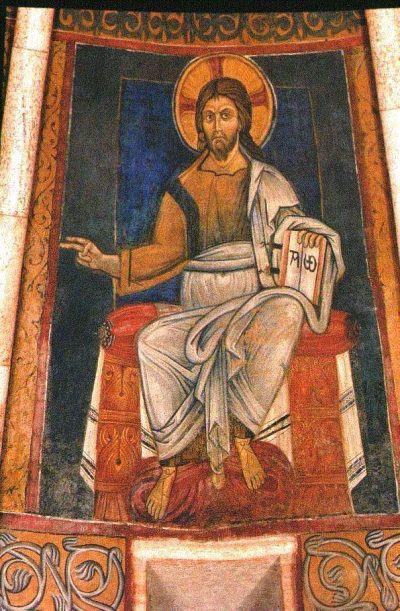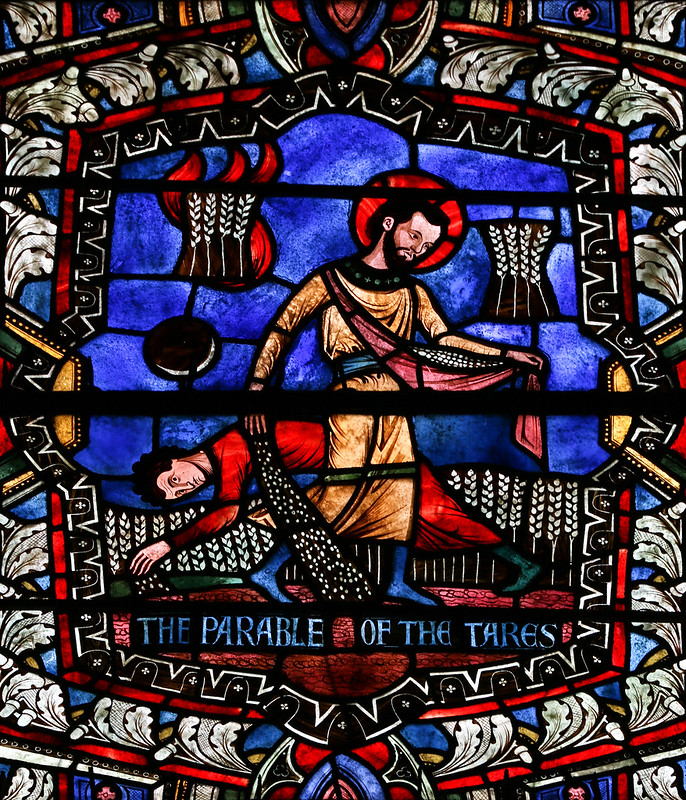Dixit Dominus Domino meo: Sede a dextris meis
Thou art just, O Lord: and thy judgment is right. Deal with thy servant according to thy mercy: and teach me thy justifications. (Psalm 118:137, 124).
The Introit of today’s Mass is, I think, related to the Magnificat Antiphon that, at Vespers last evening, allowed us to peer into the soul of Job the Long–Suffering:
In all these things Job sinned not by his lips, nor spoke he any foolish thing against God. (Job 1:22)
What was the ground of Job’s prayer? Was it not a humble confession of the justice of God and of the rightness of all His judgments?
I know that thou canst do all things, and no thought is hid from thee. (Job 42:2)
Thou art just, O Lord: and thy judgment is right. (Psalm 118:137, 124).
It is a beautiful thing in its First Mode melody, this cry welling up from the heart of Job. He confesses that the Lord is just in all that He wills and permits; he asks only that the Lord deal with him according to His mercy, and teach him His justifications.
The Collect alludes to the devil who, you will recall, makes a sulphurous appearance at the beginning of the Book of Job. The devil is sceptical of Job’s virtue. It is characteristic of the devil that he is forever looking for the fly in the ointment, seeking to entrap, to accuse, to point out the foible, to call attention to the mistake. The devil says to God that Job’s apparent virtue is just that—apparent—and that it would be interesting to test Job’s mettle. The devil, of course, wants to bring Job down. He hates Job’s humble fidelity to God, and wants to expose it all as a pious sham. Mysteriously, God, allow the devil to test Job:
Then the Lord said to Satan: Behold, all that he hath is in thy hand: only put not forth thy hand upon his person. And Satan went forth from the presence of the Lord. (Job 1:12)
You know the rest of the story. It is not unrelated to the Collect of today’s Holy Mass and Divine Office:
Da, quaesumus Domine, populo tuo diabolica vitare contagia: et te solum Deum pura mente sectari.
Grant, we beseech thee, O Lord, unto thy people to avoid (shun, push away) the temptations (contagions, infections) of the devil, and with pure minds to follow thee the only God.
The Collect makes us pray in the name of Christ, the Victor over Satan, the Divine Physician who cures souls affected by the contagion of sin. Christ, the Prince of Life has already contended with the powers of darkness in His bitter Passion and, having defeated them, emerged triumphant from the bloody fray.
Mors et vita duello
conflixere mirando:
dux vitae mortuus,
regnat vivus.
Death and life have contended
in that combat stupendous;
the prince of life, who died,
reigns immortal.
Where do we find the authentic portrait of Christ the Triumphant King, of Christ the Priest, of Christ the Exorcist, if not in Psalm 109, the very Psalm that, in the Gospel, Our Lord quotes in reference to Himself?
And the Pharisees being gathered together, Jesus asked them, Saying: What think you of Christ? Whose son is he? They say to him: David’s. He saith to them: How then doth David in spirit call him Lord, saying: The Lord said to my Lord, Sit on my right hand, until I make thy enemies thy footstool? If David then call him Lord, how is he his son? And no man was able to answer him a word; neither durst any man from that day forth ask him any more questions. (Matthew 22:41–46)
This Magnificat Antiphon at Second Vespers, graced with an exquisite 4th mode melody, will repeat the same words of Jesus:
Quid vobis videtur de Christo? * cujus filius est? Dicunt ei omnes: David. Dicit eis Jesus: Quomodo David in spiritu vocat eum Dominum, dicens: Dixit Dominus Domino meo: Sede a dextris meis?
What think ye of Christ Whose Son is He * They say all unto Him, the Son of David. Jesus saith unto them How then doth David in spirit call Him Lord, saying, The Lord said unto my Lord, Sit Thou at My right hand?
An allusion to the same Psalm 109 occurs at the very end of Saint Mark’s gospel: “So then the Lord Jesus, after he had spoken to them, was taken up into heaven, and sat down at the right hand of God” (Mark 16:19).
Again, on the morning of Pentecost, Saint Peter, filled with the Holy Spirit, preaches the mystery of the risen and ascended Christ saying:
David ascended not into heaven; but he himself said: The Lord said to my Lord, sit thou on my right hand, until I make thy enemies thy footstool. Therefore let all the house of Israel know most certainly, that God hath made both Lord and Christ, this same Jesus, whom you have crucified. (Acts 2:34-36)
Psalm 109 is a mine of Christological doctrine. Saint Paul alludes to it in Romans (8:34), Ephesians (1:20), and Colossians (3:1). We discover Psalm 109 four times in the Letter to the Hebrews.
From the time of the Apostles, Psalm 109 has been sung in contemplation of the mystery of Christ. The Church, by her use of Psalm 109 in the sacred liturgy, continues Our Lord’s own understanding of it passed on to the Apostles. Who does not cherish the incomparable seventh mode antiphon that, for over a thousand years, has opened the evening sacrifice of praise on Sunday: Dixit Dominus Domino meo: Sede a dextris meis (Ps 109:1). The Church hears the voice of Christ repeating for her what the Father said to Him on the day of His resurrection: «Sit at my right» (Ps 109:1), and she rejoices in it.
The medieval monastic psalters place a Christological title at the beginning of each psalm. Each of these old titles of the psalms—there are many series of them—say, in some way, «Here is the mystery of Christ in this psalm. Contemplate His face as in a mirror, and in this psalm learn to recognise His voice». An old psalm title gives this for Psalm 109: «Of the divinity, the humanity, the kingship, and the priesthood of Christ».
Going through the psalm, verse by verse, we see in verse 1 Christ enthroned at the right hand of the Father, an image that recurs in the Gloria of the Mass and in the Te Deum Laudamus. In verse 3 we hear the voice of the Father saying, «From the womb before the daystar I begot thee». Verse 4 is the declaration of Christ’s eternal priesthood: «Thou art a priest forever according to the order of Melchisedech». Verses 5 and 6 describe the triumph of Christ over death. In the last verse of the psalm the whole mystery of Christ’s passion, death, and resurrection is summed up: «He shall drink of the torrent in the way—the torrent of his bitter sufferings— therefore he shall lift up his head — in the glory of the resurrection and ascension».
How does all of this relate to you and me? To temptation? To sin? To the triumph of grace in our lives? When we begin to see Christ in the psalms, we begin to relate them, not only to Job and to all the Old Testaments figures and types of Christ, but also to our own life and death as well. Listen to Saint Augustine on the last verse of Psalm 109:
Let us consider Him drinking of the brook in the way: first of all, what is the brook? The onward flow of human mortality: for as a brook is gathered together by the rain, overflows, roars, runs, and by running runs down, that is, finishes its course; so is all this course of mortality. Men are born, they live, they die, and when some die others are born, and when they die others are born, they succeed, they flock together, they depart and will not remain. What is held fast here? What does not run? What is not on its way to the abyss as if it was gathered together from rain? For as a river suddenly drawn together from rain from the drops of showers runs into the sea, and is seen no more, nor was it seen before it was collected from the rain; so this hidden rain is collected together from hidden sources, and flows on; at death again it travels where it is hidden: this intermediate state sounds and passes away. Of this brook He drinks, He has not disdained to drink of this brook; for to drink of this brook was to Him to be born and to die. What this brook has, is birth and death. (Saint Augustine, Exposition on Psalm 109)
We are all of us, in the course of «the onward flow of human mortality», tested by the devil, and called, in some way, to «drink of the torrent in the way» (Ps 109:7). At the same time, our indefectible hope is that, like Christ and with him, we too shall «lift up our heads». All that the Father says to Christ is said to us. All that was accomplished in Christ our Head must fulfilled in His Body, and in each of His members. And so, as the brook flows on, we live from one Holy Mass to the next, and from one Hour of the Divine Office to the next, singing the psalms of David, the psalms of Christ, and advancing, through temptations, infirmities, losses, and trials in this valley of tears, to the triumph of Christ in us.
At certain hours we may, like Job, be compelled to say, «Although he should kill me, I will trust in him» (Job 13:15), and at all hours we can say with utter confidence, «Thou art just, O Lord: and thy judgment is right. Deal with thy servant according to thy mercy: and teach me thy justifications» (Psalm 118:137, 124).



Thank you! This is the best explanation and interpretation, to me, of the last two lines of this psalm, which have somewhat baffled me (as far as interpretation) every Sunday vespers for a lonnnnggggg time.